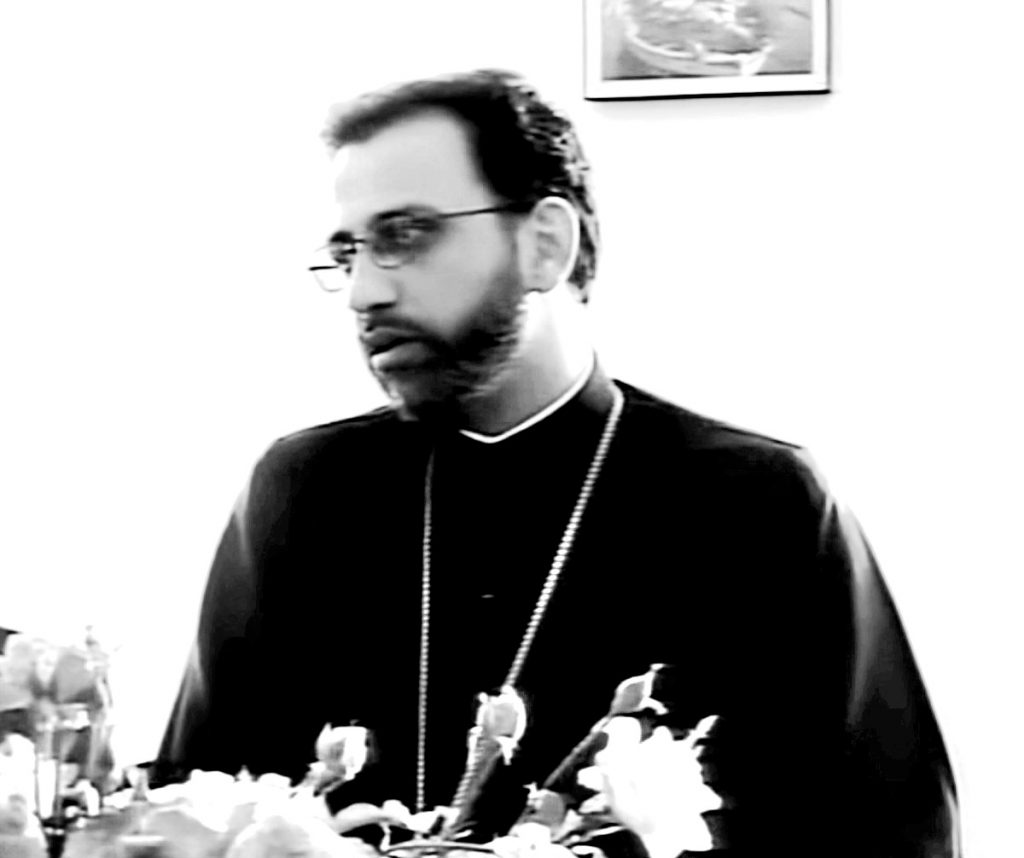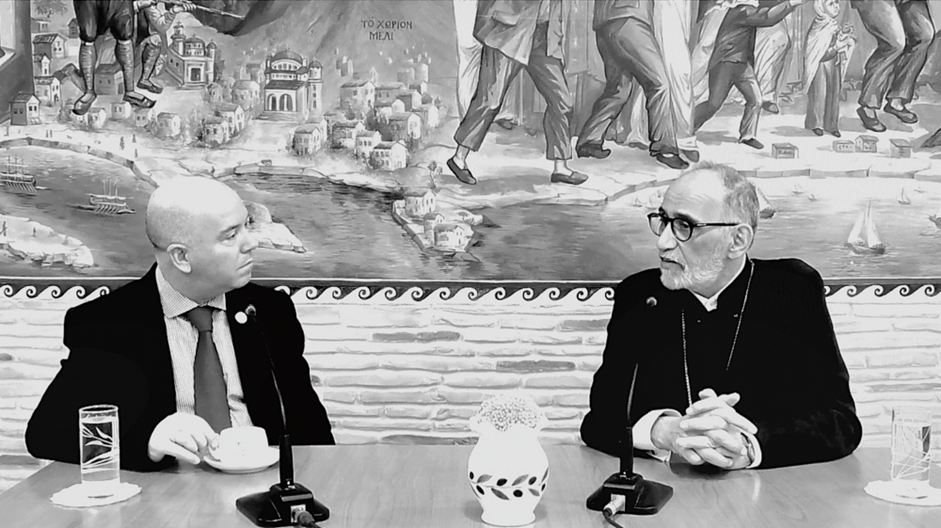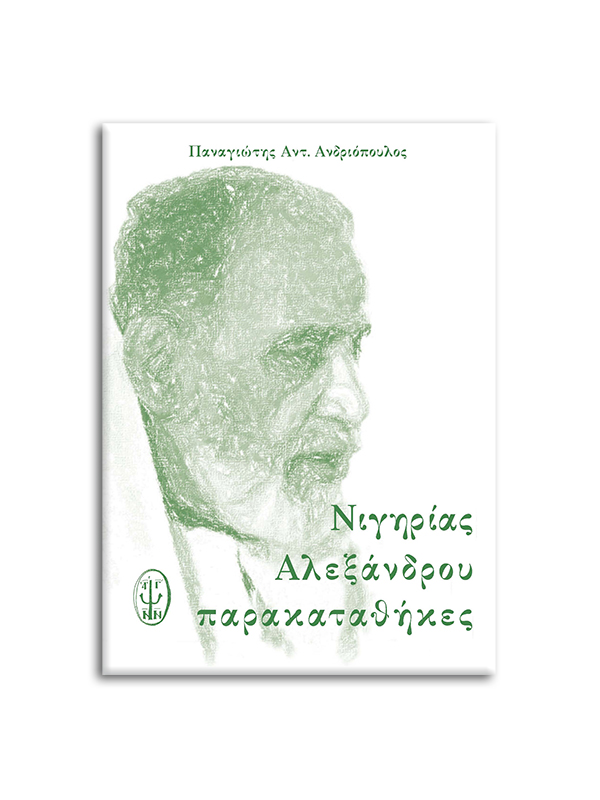PERSONAL TESTIMONIAL AND CRITICAL REVIEW
Panayiotis Andriopoulos (ed.), Alexander of Nigeria: Legacy (Athens: Eptalofos Publications, 2024), 152 pages.
Metropolitan Alexander was born George Yanniris in Athens on May 15, 1960, ordained on October 1, 1988, elected first bishop of the newly-formed diocese of Nigeria on September 23, 1997, elevated to first primate of the Orthodox Church in Nigeria on October 27, 2004, and died in Athens on June 30, 2023.
That would be a fairly conventional obituary notice for a typical Orthodox bishop. Except that Metropolitan Alexander was neither conventional nor typical. He was neither parochial nor blinkered. Perhaps it was the studies he pursued in an extra-religious discipline; in addition to a degree in theology from the University of Thessaloniki, he held a degree in agriculture from the University of Athens. Or perhaps it was his time in Africa, where he worked closely with his friend and current Metropolitan Gregory of Cameroon; the diocese of Nigeria was initially under the Archdiocese of Cameroon. He was attentive and creatively responsive to the native culture on the Black Continent; he was one of a handful of church leaders that deliberately and exclusively ordained African clergy. Yet, despite his openness and open-mindedness, Metropolitan Alexander remained humble and devout; his funeral was held at the Monastery of the newly-acclaimed St. Porphyrios at Milesi outside of Athens.
This book contains a transcription—polished and edited by Panayiotis Andriopoulos, a theologian, musician, and Archon of the Ecumenical Throne, Panayiotis Andriopoulos—of four interviews with Metropolitan Alexander organized by Andriopoulos: One was for a radio station in Patras during a youth conference, another for an informational website in Greece, and the other two for a radio program at the Cultural Center of the Parish of St. George, Neo Psychiko in Athens. The first interview (pages 11–44), conducted in July of 2000, describes Metropolitan Alexander’s early years in Nigeria. The second (pages 45–74), conducted in June 2016, contains Metropolitan Alexander’s analysis of the Holy and Great Council. The third (pages 75–109), conducted in June 2021, explores Metropolitan Alexander’s observations on the missionary mandate in the twenty-first century. And the final interview (pages 111–145), conducted in February 2022, discusses Russian invasion of Ukraine and Africa, the former by military bloodshed and the latter by ecclesiastical violation.
I remember him clearly; and I miss him sorely. The global church was just beginning to know him; and the wider church will only slowly recognize the vacuum left by his absence. I came to know him well during the Holy and Great Council in Crete in 2016, where we served as press officers of our respective churches: the Patriarchate of Alexandria in his case and the Ecumenical Patriarchate in mine. But I relished and looked forward to our encounters through the hears in a small café in the square outside the metropolitan cathedral of Athens, where we spent hours in conversation. The essence of this book in his honor—as a record or reflection of a discourse or discussion—is an appropriate tribute to a man whose worldview was shaped by simplicity and sociability, as well as by the glue that binds them together: open dialogue.

Metropolitan Alexander was comfortable speaking and serving in the language at hand, the language of his parishioners: Nigerian, English, French, or Greek—depending on the congregation at hand. His first interview offers an insight into why, despite admiration from his faithful and friends, he never received the adulation of Greek nationalists, for whom the preservation of the Greek language and customs supersedes every other ambition:
Panayiotis Andriopoulos: In an earlier meeting, you said that the fact that you are Greek is a secondary priority for you. At least, before the primary priority that that you are a missionary, and Orthodox pastor.
Metropolitan Alexander: Yes. More accurately, what I said was that I do not deny my heritage. I am undoubtedly Greek. But from the moment I entered the Patriarchate [of Alexandria], and was called to serve in a specific capacity, initially in South Africa, . . . certain principles were formed within me. From the moment, then, that I was called to serve as a bishop, as the president of a eucharistic assembly in the Church of Nigeria, I consider the principal and primary element of my identity is not my Greek origins, not my ethnic roots, but the fact that I am a clergyman, indeed an Orthodox bishop in a specific place.
I think this is very essential in order for us to advance and overcome any prejudices that we impose on local populations, whether Nigerian or Ugandan or anything else. We are not an ethnic Church. Because so long as we persist in moving within our narrow—painfully narrow—national boundaries; so long as we insist that we centered on Greece or, more aptly, focused on Hellenism, the barriers that we come across will only be greater, and we will only be further estranged from the very nature and essence of the Church.

While confessing his frustration at the limited agenda of the Holy and Great Council, Metropolitan Alexander also admits its distinct and historic uniqueness in assembling the disparate Orthodox Churches throughout the planet, despite the insincere withdrawal of some of them at the last minute. His conviction was that, if the autocephalous churches wanted the Great Council to succeed, then they would have found a way to make it work. I was touched by his recognition:
It is my humble, personal opinion that there was a mistake, a sin, a theological deficiency here. By deconstructing the Council or refusing to attend, I am fundamentally declining to meet with others face-to-face. Theologically, this is fallacious. We should all have participated. We should be there because we should meet face-to-face. We should go because, as the Ecumenical Patriarch said and wrote, . . . in spite of the challenges, at some point we are obliged to make a start, to take a first step.
And I fully share his disappointment that the topics and texts on the agenda were far more conservative that the original proposals submitted in the 1960s.

Metropolitan Alexander’s transparency is particular evident in his interview about missionary work in Africa, where he courageously criticized the interference—actually, spiritual and financial blackmail—of monastics on Mt. Athos, who instead of focusing on prayer and silence decided to threaten removal of financial support of the missionary Patriarchate of Alexandria for deciding to ordain women deacons:
Financial poverty is inextricably bound to the missionary machine, which can often justify wrongful behavior, even from among our own people, who are not always well-intentioned. We are sometimes smothered by such people. However, the hardest thing is to resist the effort of some benefactors to impose a missionary mode and model of their own . . . It is unfortunately true, and I apologize for saying so, but we even have interference from Mt. Athos . . . When the Synod of our Patriarchate deliberated on the ordination of women deacons after the Holy and Great Council, I recall the letter sent by a particular monastery on Mt. Athos to the relevant Metropolitan . . . which subsequently became public, which toward the end noted that ‘we are sorry, but we are afraid that this may influence the considerable financial support of your Metropolis, should the Patriarch proceed with this proposal, because our pious Christians will be upset and scandalized to the point where they may not provide money.’ If this isn’t economic extortion, then I don’t know what is.
In addition, I am moved by Metropolitan Alexander’s emphasis on human rights and freedom of speech, his concern for hunger and poverty, as well as his understanding of fasting and marriage in the context of the African people. He identified with the distinct dietary needs of a poor laborer, who needed protein for survival, and with the indigenous marital expectations of a developing nation, which was indifferent to western problems such as mixed marriages.
Finally, there is the tragic impact of Metropolitan Alexander’s reminder that Orthodox Christians hardly collude with abhorrent crusades in the history of Western Christianity. He outrightly condemns as hostility and heresy the fratricide incurred by Putin’s invasion of the sovereign state of Ukraine as well as the breach of unity created by Kirill’s infringement of the autocephalous Church of Alexandria. And he attributes both to the imperialism and expansionism of the “Russian World” that precedes the Great Council and the Autocephaly of Ukraine. The deceitful and calculating machinations of such players as Patriarch Kirill of Moscow and Metropolitan Hilarion of Hungary [formerly of Volokolamsk] are exposed as shameless and savage. He castigates the collective corruption of the Patriarchates of Russia and Antioch—along with their obsequious champions—that could obsess with the appropriation of a single parish in Qatar to justify their absence from the Great Council, yet blind to the occupation of an entire continent by the Church of Russia.
Metropolitan Alexander was a breath of fresh air in a stifling hierarchy, an advocate for synodality in a system of secrecy, and a voice for freedom in a church of authority. I was privileged to be his friend. And I am honored to offer this modest tribute in his memory.
Fr. John Chryssavgis

